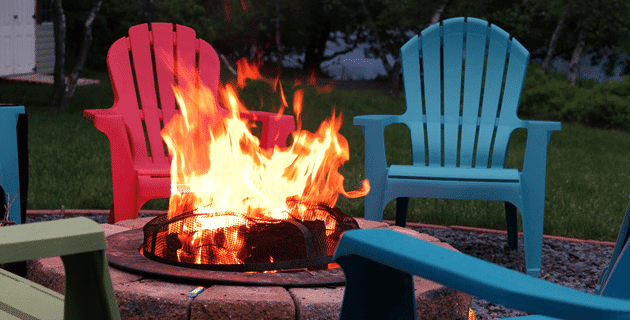Dry, hot weather makes the risk of fire especially dangerous in many parts of the country. Even if you’re not in a region prone to wildfires, you could be affected. Fires can happen anywhere, and once they start, they can spread quickly, putting your property and home at risk.
Fire prevention starts in the yard, and there are some simple steps that you can take to protect your home and property.
Fire Prevention Steps to Take for Free
-
- Remove flammable materials from your yard, especially from 5 feet around your home. These include bark mulch, dried leaves, and garden debris. Also, remove any tree branches that hang low and could fall on your house.
- Keep your yard clean by regular raking. Use a steel rake to remove dead grass and leaves and place them on a tarp. Then transfer them into a leaf bag placed far from your house or put them into a fireproof composter.
- Replace your plants with low flammability plants. While no plant is fireproof, there are some plants that are more difficult to ignite due to their high moisture content. These include sedum, succulents, cacti, lilac, and lavender.
- Pro Tip: Highly flammable plants often have gummy sap and/or leaves that carry a strong odor when crushed. It’s probably best to avoid these types of plants.
- Space your plants farther apart so it’s harder for them to ignite each other. Also, keep plants and grass watered regularly. Avoid planting anything that could catch fire and block your escape from windows or doors.
- Do not store anything under your deck that can catch fire. Move any stored wood well away from your house.
- Follow fire pit and barbecue safety when using those items.
Low to Moderate Cost Fire Prevention Adjustments
-
- Remove wooden or plastic garden borders and replace them with stone or corrugated steel landscape edging. Replace mulch with gravel or seashells.
- Cover your eaves or openings in the exterior walls of your home with 1/8-inch metal screens to block embers.
- Install metal gutter guards to keep leaves and pine needles out of gutters. These can become dry and brittle and add fuel to a fire.
- If you have a deck, install metal wire mesh no larger than 1/8 inch to prevent dry leaves from collecting underneath.
- Plant deciduous trees, such as Serviceberry trees, that don’t produce a lot of dead wood. Avoid conifers such as pine, juniper, or spruce trees.
More Costly Fire Prevention Actions
-
- Redo your wooden deck with fire-resistant decking materials.
- Add hardscaping to your property. This can create a break in vegetation that can slow down or stop the spread of a fire. Plan for paths at least 4 feet wide.
- Install concrete retaining walls. These also can help slow or stop a spreading fire.
- Consider fiber cement or aluminum siding which stand up to heat better than their more combustible alternatives such as vinyl. You also can add flame retardants to wood siding or surfaces.
- Add steel exterior shutters to pull down over windows to keep a fire’s heat from shattering the glass. You also can install double or triple-paned windows.
In Case of a House Fire
Make sure that you are in the best position to protect your property and your home in case a fire does occur. Here are some ways that you can prepare.
-
- Check your property to ensure that emergency vehicles, including firetrucks, will have easy access to your home and can get close enough to deploy their hoses.
- Keep a hose available in your shed or fire extinguisher on your property away from your house in case you need it.
- Make sure you have smoke detectors on every floor of your home and check them monthly.
- Store extra extension cords nearby in case you need them. They may be useful to power emergency lights after dark.
- Create a family disaster plan so that everyone knows what to do in the event of a fire. Make disaster preparations for your pets as well.
- Make sure you have home insurance that protects against damage caused by natural disasters such as wildfires. The right insurance provides peace of mind in the event of a fire.
This article is furnished by California Casualty, providing auto and home insurance to educators, law enforcement officers, firefighters, and nurses. Get a quote at 1.866.704.8614 or www.calcas.com.
- Graduation – When to Remove Your Child from Your Auto Policy - May 18, 2023
- How to Prevent Catalytic Converter Theft - May 17, 2023
- How Much Does Home Insurance Cost? - May 17, 2023

